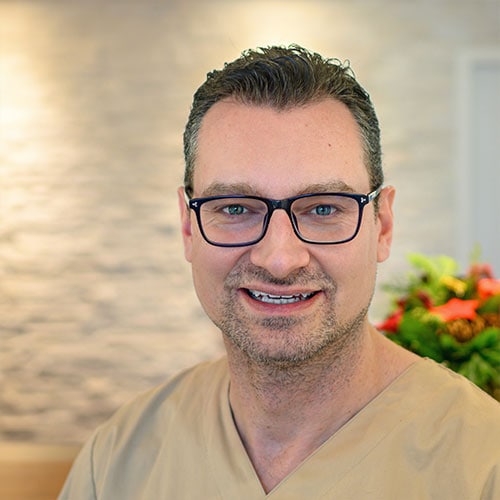Biological Dentistry

Biological dentistry is a concept in modern dentistry that integrates the principles of biology and places a strong emphasis on enhancing health. The foundational pillars of biological dentistry include the use of biocompatible materials and addressing the root cause of diseases.
What is Biological Dentistry?
The term “Biological Dentistry” emerged from the integration of biological considerations into dentistry, leading to the alternative term “Biological Dental Medicine.”
Many health problems have their origins in the oral cavity. Toxic materials, jaw inflammations, or anatomically incorrect bites can significantly impact health. The core idea of biological dentistry is to optimize health by eliminating dental root causes of diseases.
Through comprehensive patient history and diagnostics, the causes of the disease are identified, and treatment options are discussed. The therapy for the root cause is performed gently, utilizing only materials that are compatible with health. Supportive measures ensure a rapid and uncomplicated healing process.
Biological dentistry holds a prominent position in Switzerland. Throughout the country, there are numerous dentistry-focused companies that produce ceramic implants. These include Zirkon Medical Management AG, SDS Swiss Dental Solutions AG, Nobel Biocare AG, and Institut Straumann AG.
Pillars of Biological Dentistry
There are three crucial pillars of biological dentistry. All pillars are interconnected and hold individual significance for each patient. The foundational pillars include addressing the root cause of diseases, utilizing biocompatible materials, and restoring the proper anatomy of the masticatory system.
Addressing the Root Cause
Many physical symptoms originate in the oral cavity, where inflammation, toxins, and allergens can significantly contribute to the development of chronic diseases.
Chronic gum inflammation or periodontitis, as well as jaw inflammations like NICO/FDOJ, can lead to health issues and, accordingly, represent a cause of the problem. Diagnosing and treating these dental root causes are essential aspects of biological dentistry.
An anatomically and functionally incorrect bite with improper jaw joint positioning can also trigger pronounced symptoms of temporomandibular disorders of the joints (TMJ) and substantially affect the quality of life (see below).
Most symptoms have one or more causes. Identifying and treating these root causes is the foundation for a lasting improvement in the overall health situation.
Biocompatible Materials
Biological dentistry focuses extensively on the interactions of dental materials with the body, considering toxicity and effects on the immune system. Occasionally, the term “metal-free dentistry” is used because metals in the oral cavity can play a health-critical role.
Materials and substances are chosen in a way that minimizes the impact on health. Simultaneously, it is crucial to safely remove health-risky materials, such as amalgam fillings, under protection (please see also Amalgam removal). More information on this topic can be found in the article “Environmental Dentistry“.
Correct Anatomy and Function
A proper anatomy of the teeth, jaws, and temporomandibular joints is closely linked to flawless dental function. Consequently, the goal of biological dentistry should be to restore this lost anatomy.
Healthy dental anatomy can be compromised by old fillings, crowns, or teeth grinding. Unnatural tooth positioning, unfavorable alignment of the upper and lower jaws, and incorrect positioning of the temporomandibular joints are also anatomical issues that should be considered. Such anatomical deviations from the natural, correct bite situation can influence the entire body’s posture and disrupt balance.
Especially in cases of temporomandibular disorders of the joints (TMJ) symptoms, it is crucial to address the root cause of the structural problem and bring the masticatory system back to the anatomically correct situation.
Biological Dentistry Therapies
There are various therapies and measures that are used in biological dentistry. These serve to relieve the body and optimize wound healing.
- Amalgam removal under protection: The old amalgam filling is safely removed with the help of protective measures so that the patient and staff are not exposed.
- Ceramic implants: Ceramic implants offer a healthy alternative to titanium dental implants. With the help of an optimally coordinated team, major restorations can be carried out easily in one appointment so that you can receive your fixed teeth in one day.
- Minimally invasive surgery: A careful surgical approach, with maximum preservation of the jawbone and gums, is a prerequisite for good wound healing and ideal aesthetics. This minimizes the risk of complications after wisdom tooth surgery, for example.
- TMJ and temporomandibular joints: TMJ results in an abnormal position of the temporomandibular joints, which has a significant impact on overall body statics and general health.
Biological Dentist - Knowledge and Experience
An experienced biological dentist possesses extensive knowledge of health connections and the causes of chronic diseases. As alternative treatment methods can be applied to support therapy, biological dentists often exhibit proficiency in naturopathy, homeopathy, or acupuncture.
Biological dentistry is a broad field, emphasizing the importance of high knowledge and years of experience, particularly in the following areas:
- Ceramic implants
- Oral surgery
- Naturopathic dentistry
- Chronic diseases or chronic inflammations
- Temporomandibular disorders (TMD/TMJ) and functional therapy
- Anatomical bite reconstruction
For an optimal and comprehensive therapy for our patients, Alpine BioDental has a qualified team where each biological dentist possesses specialization and core competence. In collaboration with the ideally coordinated in-house dental laboratory, errors can be minimized to a minimum.
Biological Dental Practice - Facilities and Options
A biological dental practice is optimally equipped for both diagnostics and therapy.
Diagnostic capabilities include advanced technologies such as 3D X-rays (CBCT) and CaviTAU® bone density measurement. Thorough diagnostics help avoid planning errors and achieve an ideal treatment outcome.
Therapeutic options in the practice encompass procedures such as ceramic implants, removal of jaw inflammations, and the regeneration of temporomandibular joints, followed by anatomical bite reconstruction. Accordingly, the dental practice and the dental laboratory should be ideally equipped.
Furthermore, it is advisable to complement therapy with supportive measures such as the use of ozone, APRF (Advanced Platelet-Rich Fibrin), and naturopathic methods. This helps minimize the risk of complications and optimize the final result.
Dr. med. dent. Jochen Bastian
At Alpine BioDental, we are ideally equipped in all areas of biological dentistry, allowing us to offer our patients even complex dental restorations at the highest level.

Frequently asked Questions about Biological Dentistry
This section addresses some common questions about biological dentistry to provide you with as much information as possible on the topic. For additional details, please refer to the “Questions & Answers” chapter.
Yes, the initial appointment involves significantly more time allocated for a comprehensive patient history and diagnostics. This is crucial to precisely identify the root causes of diseases and thoroughly inform the patient about all available treatment options. For more details, please refer to “Biological Consultation“.
No, a complete avoidance of chemicals is not possible, as most dental materials consist of chemical components. However, it is essential to use only the highest quality materials with the best compatibility.
Similar health-focused concepts include Holistic Dentistry or Environmental Dentistry. Please also read about our Alpine BioDental Treatment Concept.
Further Information
The additional information is intended to provide you with a better overview of the topic.